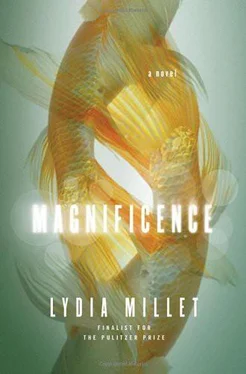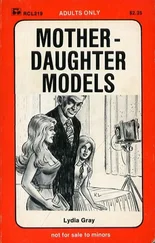“Are those two guys ?” asked Steven. “Making out?”
“It’s two old guys,” said Tommy. “Whoa.”
She checked her impulse to comment and went through the dining room door ahead of them.
“So what can I get you, Tommy?”
“I need a strong one after that,” he said. “Gimme a vodka. Man . You got any Absolut Citron?”
“I don’t think so,” she said. “We do have some mixers.”
“I’ll take a Bud,” said the father.
From behind the bar she could see Casey and Jim and some of her former neighbors outside. She missed them.
“Let’s get some fresh air, shall we?” she said, once both of them had their drinks in hand, and led them through the French doors.
“Hah-ey,” said Dewanne, smiling widely as they approached. She was a thrice-divorced Southern belle and more times than that cosmetically enhanced; she’d lived two houses down. She was also an avid catalog shopper, in a constant state of indignation at the perceived abuses of mail-order apparel companies. The indignation was a hobby. When they both had teenagers in high school — she was a housewife and Susan was substitute teaching — she would come over to the house in the late afternoon, a glass of white wine with ice cubes in her hand, and call 800 numbers to harangue operators about merchandise quality.
Susan had always liked her.
“Hi, Dewanne,” she said, and reached out to grab her hand.
“So who have we here? Introduce me to your cute friends, Susan.”
“My cousin Steven,” she said. “His son, Tommy.”
“Hey, Tommy,” said Casey. “Last time I saw you we hadn’t even hit puberty.”
“Hey, Casey,” said Tommy stiffly, but made no move in her direction.
“You were into Star Trek ,” said Casey.
“I don’t remember that.”
“Denial is common. But I remember all too well. You always tried to give me a Vulcan nerve pinch.”
Tommy lifted his vodka and drank, projecting an aura of distrust.
“That was his geek period,” said Steven, and elbowed his son in the ribs.
“All in the distant past now,” said Casey, and grinned.
“He’s got a job in Portland cement!” said Susan.
“Ground granulated blast-furnace slag,” corrected Tommy.
“So, Tommy,” said Casey brightly. “Let’s catch up then, shall we? Come tell me all about that slag.”
She inclined her head toward a nearby table, and Tommy shuffled off after her with some reluctance.
“Hey, name’s Jim,” said Jim, and held out his hand to Steven.
“Sorry, how rude of me,” said Susan, and finished the round of introductions.
When Susan paid attention next Steven was saying to Dewanne, “So what are you, one of her teacher friends?”
“Just a neighbor,” said Dewanne. “From the old neighborhood. And what do you do, honey?”
“I run my own business. In programming.”
“Oh my ,” said Dewanne.
She would leave the two of them alone, thought Susan, and Dewanne might win him over. Dewanne graciously liked everyone, even sleazebags.
But really, for the cousins, forget the guest list and the food selection; she should have cut straight to the chase and ordered up some working girls.
“You ready for a refill?” asked Jim.
“I’ll come with you.”
Better this way — better to leave her relatives with people who could stand them.
She and Jim slipped away for ten minutes, snuck into the room with the ducks and locked the door behind them. But then, in the yellow-green glow from the stained-glass lamps, in the drowsy aftermath of the pot, she drifted. She woke up later in the quiet and realized it, alarmed. She had fallen asleep. She sat up with a jolt. Damn it, she’d missed her own party.
The house was still beyond the door, the clock on the wall read 2:48. She had not meant to vanish. How inconsiderate, how wrong. Also, she’d screwed up the cousin thing. She felt panicky.
She got up and pulled her clothes on in a rush, the dress, the heels. The music was turned off, she thought, or she’d be hearing it. Her guests must all have left, gone to their homes. Some must have asked where she was, some must have felt ignored or irritated — but anyway she had to know, if there were any still here she had to go out there, play the hostess, take care of them.
She left Jim sleeping on his side, mouth agape on the pillow, opened the door and stepped out into the silent hall. A few lights were still on, here and there, but overall it was dim and on the edges of her vision she had an impression of orange and black shades in the rooms, great caves looming off to the sides, beer bottles on the tables, wineglasses on the windowsills. Ashtrays, empty food bowls on surfaces — how many guests had there been, after all? Thirty, she thought, thirty guests at the most, but now it looked like more, it looked like forty or fifty.
She passed the ballroom and saw the doors. They all stood open still and the drapes rushed out in rills when the breeze came up. It was a chill breeze now, in the small hours. She would close the doors, she thought, and went into the room. In the dimness she stepped across a trail of crackers, crumbling to powder underfoot, and walked toward the pool, visible through the line of doors with its wavering aqua light. She started to shut the doors and then thought she saw something outside, a movement in the back garden beyond the corner of the pool enclosure. For no good reason she thought of burglars, then chided herself for paranoia.
But someone was still here, she thought. Someone remained.
She went through the doors, planning what to say if it was Steve or Tommy — how to appear gracious and pretend she hadn’t retreated into a back room to get laid and then, stoned as a twelve-year-old on his first high, abandoned them. As though, somehow, she was controlled and prim. This was how she wished to appear in their eyes: someone who was responsible, grateful, and unduly burdened. Someone straight as a pin and fully deserving of their charity.
Give it up, she told herself, moving onto the patio.
Alternatively she could confess her guilt, make a clean breast of her character flaws and throw herself on their mercy. She went around the pool and opened the gate on the far side, heard it creak behind her and stepped out onto the path that led between the koi ponds and the willows. There were footlights along the pathways and she was glad of them. She stopped on the flagstones and listened. She thought she heard a whisper; she didn’t want to interrupt anything. But then — she stopped again, holding her breath — maybe it wasn’t intimate, maybe it was just talk.
Further along the path the bushes were closer beside her, there was less room to move, and the sound of her heels on the uneven stones seemed louder. She peered through the dark. There was a bench in the trees, back there, with footlights around it — a small paved area, one of the round wrought-iron tables, and she went toward it cautiously. There were shapes under the trees, near the bench — a wheelchair, facing her, more or less, and sitting in it a girl with long hair, her face down. For a second she thought it was Casey, before she knew it wasn’t.
It must be the college girl, she thought — still shocked, in the background of her recognition, that her own daughter was not a college girl, apparently would never be. It wasn’t Nancy, because Nancy’s hair was shorter. It had to be the younger girl, the one who had multiple sclerosis.
She was about to say something to her, was wracking her brain for the name, but then she blinked, her eyes nearly aching from the strain. She could make out another figure, on its knees, its head in the young woman’s lap. A man, must be. Because of the footlights she could see lower but not higher up — see the man’s bent legs, the vertical planes of the soles of his shoes, even their patterning, with the orange light from the sodium lamp shining onto the grooved rubber surface. She moved around to try to make him out, so the wheelchair was more in profile. But his head was down and she could not see his face. Indistinct sounds of choking. Was it sex? No: the man was crying, or sniveling at least, and the girl was speaking in low, consoling tones. They were drunk, or at least the man was drunk — the man was well on his way to wasted. The girl might not be drunk at all, as Susan recalled, she probably didn’t drink — her way of speaking had stutters and pauses, had slushy consonants — it was common with her disease, Casey had said. But the man slurred when he spoke, slurred and mumbled, and with him it was all drunkenness.
Читать дальше












